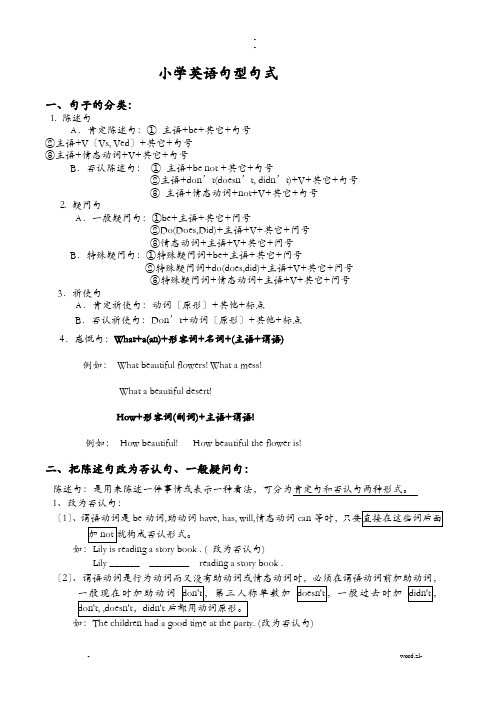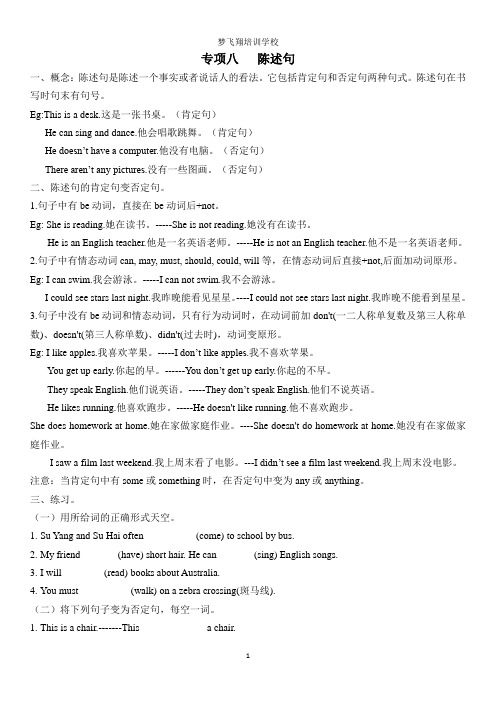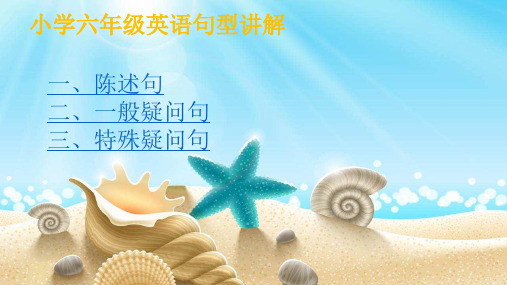小学英语陈述句和疑问句
小学英语句型句式

小学英语句型句式一、句子的分类:1. 陈述句A.肯定陈述句:①主语+be+其它+句号②主语+V〔Vs, Ved〕+其它+句号③主语+情态动词+V+其它+句号B.否认陈述句:①主语+be not +其它+句号②主语+don’t(doesn’t, didn’t)+V+其它+句号③主语+情态动词+not+V+其它+句号2. 疑问句A.一般疑问句:①be+主语+其它+问号②Do(Does,Did)+主语+V+其它+问号③情态动词+主语+V+其它+问号B.特殊疑问句:①特殊疑问词+be+主语+其它+问号②特殊疑问词+do(does,did)+主语+V+其它+问号③特殊疑问词+情态动词+主语+V+其它+问号3.祈使句A.肯定祈使句:动词〔原形〕+其他+标点B.否认祈使句:Don’t+动词〔原形〕+其他+标点4.感慨句:What+a(an)+形容词+名词+(主语+谓语)例如:What beautiful flowers! What a mess!What a beautiful desert!How+形容词(副词)+主语+谓语!例如:How beautiful! How beautiful the flower is!二、把陈述句改为否认句、一般疑问句:陈述句:是用来陈述一件事情或表示一种看法,可分为肯定句和否认句两种形式。
1、改为否认句:〔1〕、谓语动词是be动词,助动词have, has, will,情态动词can等时,改为否认句)Lily ______ ________ reading a story book .〔2〕、谓语动词是行为动词而又没有助动词或情态动词时,必须在谓语动词前加助动词,改为否认句)The children _________ _________ a good time at the party.2、改为一般疑问句:一般疑问句:以be动词, have /has/do等助动词、can/may/will等情态动词开头,以或〔1〕be改为一般疑问句)___________________(2)、谓语动词是行为动词时,必须在句首加上助动词如:I had some cotton candy . (__________________________________________________注意:在把肯定句改成否认句或一般疑问句的时候,要注意句中是否有already、some、something、somebody等词,如果有也必须进展改变,already要改成yet,some、something、somebody等分别改成any、anything、anybody等。
小学英语陈述句变一般疑问句规则

小学英语陈述句变一般疑问句规则
一般疑问句是用来询问一个陈述句是否正确的句子。
在将陈述句变为
一般疑问句时,需要将陈述句的语序进行调整。
以下是小学英语中将陈述
句转换为一般疑问句的规则:
1. 当陈述句中有助动词(be动词)时,将助动词移到句首。
例如:
陈述句:He is a student.
一般疑问句:Is he a student?
2. 当陈述句中没有助动词时,需要在句首加上助动词do或does,
并且将原句中的动词用原形表示。
例如:
陈述句:They play soccer.
一般疑问句:Do they play soccer?
陈述句:She likes ice cream.
一般疑问句:Does she like ice cream?
注意:当主语是第三人称单数(he、she、it)时,要使用助动词does。
其他情况下使用助动词do。
3. 当陈述句中有疑问词(如who, what, where, when, why, how等)时,将疑问词移到句首,并且需要在句末加上问号。
例如:
陈述句:You go to school by bus.
一般疑问句:Do you go to school by bus?
陈述句:He lives in Shanghai.
一般疑问句:Where does he live?
需要注意的是,对于一般疑问句的回答,肯定回答用"Yes, "加上完整的句子,否定回答用"No, "加上完整的句子,并且需要将be动词、助动词、谓语动词等与主语进行一致变化。
小学毕业陈述句和疑问句

专项八陈述句一、概念:陈述句是陈述一个事实或者说话人的看法。
它包括肯定句和否定句两种句式。
陈述句在书写时句末有句号。
Eg:This is a desk.这是一张书桌。
(肯定句)He can sing and dance.他会唱歌跳舞。
(肯定句)He doesn’t have a computer.他没有电脑。
(否定句)There aren’t any pictures.没有一些图画。
(否定句)二、陈述句的肯定句变否定句。
1.句子中有be动词,直接在be动词后+not。
Eg: She is reading.她在读书。
-----She is not reading.她没有在读书。
He is an English teacher.他是一名英语老师。
-----He is not an English teacher.他不是一名英语老师。
2.句子中有情态动词can, may, must, should, could, will等,在情态动词后直接+not,后面加动词原形。
Eg: I can swim.我会游泳。
-----I can not swim.我不会游泳。
I could see stars last night.我昨晚能看见星星。
----I could not see stars last night.我昨晚不能看到星星。
3.句子中没有be动词和情态动词,只有行为动词时,在动词前加don't(一二人称单复数及第三人称单数)、doesn't(第三人称单数)、didn't(过去时),动词变原形。
Eg: I like apples.我喜欢苹果。
-----I don’t like apples.我不喜欢苹果。
You get up early.你起的早。
------You don’t get up early.你起的不早。
They speak English.他们说英语。
-----They don’t speak English.他们不说英语。
英语中的陈述句和疑问句

英语中的陈述句和疑问句在英语语法中,陈述句和疑问句是两种非常基础但也非常重要的句型。
陈述句用来陈述事实或陈述观点,而疑问句则用来询问信息或确认一个观点。
本文将对这两种句型进行详细的讲解和比较。
陈述句陈述句是在英语中最常见的一种句型,也是最基本的一种。
它用于陈述事实,表达观点或描述某种情况。
一个典型的陈述句通常以主语开头,然后是动词和谓语,接着是其它补充信息。
例如:The sun rises in the east every morning.(太阳每天早上从东方升起。
)在这个例句中,“The sun”是主语,“rises”是动词,“in the east”是补充信息,而“every morning”则是补充更多的细节。
这个句子的语气是肯定的,也就是说,它表达了一种肯定的信念或者正确的观点。
另外,英语中也有一些特殊结构的陈述句,比如状语从句、倒装句和强调句等等。
这些句子的结构更为复杂,但所有的陈述句都扮演着描述和解释的角色。
疑问句与陈述句相对应,疑问句则用于提问或请求某种信息。
一个疑问句的基本结构通常由疑问词开头,然后是主语和谓语,最后是其它补充信息。
例如:What time is it now?(现在几点钟了?)在这个例句中,“What”是疑问词,“time”是主语,“is”是谓语,而“now”则是补充信息。
这个句子的语气是问询的,也就是说,它希望得到某种信息或者确认某种观点的正确性。
除了一般的疑问句,英语中还有一些特殊的疑问句,比如反义疑问句和选择疑问句。
反义疑问句用于等待肯定或否定的回答,选择疑问句则只有两种选项,用于询问主语需要选择哪种。
比较陈述句和疑问句陈述句和疑问句虽然拥有不同的功能,但它们在一些方面也有相似之处。
首先,它们都是构成一句话的基本元素,每句话都必须包含有主语和谓语。
其次,所有的陈述句和疑问句都必须符合语法的规则,否则句子会不合理或者难以理解。
最后,陈述句和疑问句都有一个标志性的声调,使其易于被别人辨认。
小学英语一般疑问句和陈述句转换

Is this a book? Yes,it is. No,it isn’t.
this that
it
一般疑问句
Do they work every day? Yes, they do. No, they don’t.
Are these books? Yes,they are. No,they aren’t .
He can draw a tree.
Can he draw a tree? Yes,he can. No,she can’t.
Practise
I have a sister.
Do you have a sister? Yes,I do. No,I don’t.
This is an apple.
Is this an apple? Yes,it is. No,it isn’t.
Is it a dog?
Is it a pig?
Is it a pig?
一般疑问句
一般疑问句
am,is,are Is it/he/she…? Are you/they…?
板书部分
由Be动词,助动词,情态动词 引导的疑问句。 Is it ….?是由Be动词引导的一般 疑问句;
一般疑问句
do,does ,did
一般疑问句
Can you…?
由Be动词,助动词,情态动词引 导的疑问句。
Can she/he/it..? Is it ….?是由Be动词引导的一般疑
Can they..?
问句;
Do you like apple? Do you…? Does she/he/it….? Can they read this news? Did you/she/he/it …?是由助动词
陈述句、一般疑问句和特殊疑问句

肯定句否定句转换习题。
1. Tom and Mike are friends. 2. I’m a students. 3. There are some books in the study. 4. Your father can ride a bike. 5. They can play football after school. 6. We come from China. 7. He likes playing basketball. 8. Have some bread, Tom. 9. Don’t eat food in the study. 10.We can’t swim. 11.They aren’t friends. 12.You aren’t my friends.
二、一般疑问句(一般读升调)
(一)什么是一般疑问句 用yes或no回答的疑问句叫作一般疑问句。
(二)一般疑问句特征 以be(am, is are)动词,情态动词(can, should, will…)以及以助动词(do, does) 开头的疑问句。注意:通常读升调
1. Is he a student? 2. Can you swim? 3. Do you like apples?
ห้องสมุดไป่ตู้
7. whose对物体的所属提问,意为:谁的,Whose bike is this? 8. how对方式和程度提问,意为:怎么 How do you come to school? 9. how many对可数名词数量提问,意为:多少,
How many books do you have? 10. how much ①对不可数名词数量提问,意为:多How much rice do you need ②对物体的价格提问,意为:多少How much is this ruler? 11. how old 对年龄提问,意为:多少岁How old are you ? 12. how long对长度提问,意为:多长 How long is your hair.
英语陈述句及疑问句知识点及习题

一、陈述句:是用来陈述一件事情或表示一种看法,可分为肯定句和否定句两种形式。
1、谓语动词是be动词,助动词have, has, will,情态动词can等时,只要直接在这些词后面加not 就构成否定形式。
eg. Lily has already read this new book. (改为否定句)Lily(has not read) this new book(yet).2、谓语动词是行为动词而又没有助动词或情态动词时,必须在谓语动词前加助动词,一般现在时加助动词do ,第三人称单数加does,一般过去时加did,再和not构成否定结构。
必须指出的是:don't, doesn't, didn't后都用动词原形。
eg.1)Jill has lunch at school every day. (改为否定句)Jill (doesn’t have)lunch at school every day.2)The children had a good time at the party. (改为否定句)The children(didn’t have) a good time at the party.3)Rose didn't drink any milk this morning.(改为肯定句)Rose( drink some)milk this morning.二、疑问句:是用来提出问题的句子。
A.一般疑问句:以be动词, have /has/do等助动词、can/may等情态动词开头,以yes或no来回答的问句。
它的基本结构是:Be/Have /Has/Did等助动词(包括情态动词)+主语+谓语(包括表语)+┄?回答常用简略回答。
1、谓语动词是be动词、助动词、情态动词时,只要直接把这些词置于句首,句末改成问号。
eg. There's something wrong with his bike.(改成疑问句)(Is there anying) wrong with his bike?2、谓语动词是行为动词时,必须在句首加上助动词Do、Does(三单)、Did(过去式)加上这些助动词后,句子中谓语动词必须用原形。
小学英语 句法:陈述句 THERE BE 句型

否定句 There is not a bottle beside the plant. There is no bottle beside the plant.
一般疑问句 Is there a bottle beside the plant?
肯否回答 Yes, there is.
No , there isn’t.
2.There be 句型的特殊疑问句
How many seasons are there in a year? How many girls are there in our class?
肯否回答 Yes, there are. No, there aren’t.
There be
There is/was + 单数
There are/weere+复数
1.就近一致原则
There is a computer and two cups on the desk. There are two cups and a computer on the desk.
ducks
on the lake
肯定句 There are some ducks on the lake. 否定句 There are not any ducks on the lake.
There are no ducks on the lake. 一般疑问句 Are there any ducks on the lake?
变变T疑 否h问定e,,r很很e简轻b单松e,,+bbee名须后大no词写t记来心+提中地前。。点。
肯定句某中地用有s某om物e,否定疑问any 换。
There be
There is + 单数 There are+复数
- 1、下载文档前请自行甄别文档内容的完整性,平台不提供额外的编辑、内容补充、找答案等附加服务。
- 2、"仅部分预览"的文档,不可在线预览部分如存在完整性等问题,可反馈申请退款(可完整预览的文档不适用该条件!)。
- 3、如文档侵犯您的权益,请联系客服反馈,我们会尽快为您处理(人工客服工作时间:9:00-18:30)。
陈述句:就是成熟一个客观事实或表达一个看法的句子,陈述句在
书写时句末用句号,在朗读时用降调。
陈述句可分为“肯定陈述句”和“否定陈述句”两种,简称为肯定句和否
定句。
肯定句的基本结构为:主+谓+其他,例如:
That little girl is an American. 那个小女孩是美国人。
My mother likes music. 我妈妈喜欢音乐
否定句的基本形式包括以下两种
1、在系动词am, is, are,助动词have, has, do, does, did及情态动词
can, will, must, might等后面加上“not”。
例如:
He is mot a worker. 他不是工人。
I don’t like pop music. 我不喜欢流行音乐。
He can’t speak English. 他不会说英语。
2、使用“not”以外的否定词。
⑴使用副词:never,seldom,hardly,little,neither等。
例如:
She never comes to school late. 她上学从不迟到。
She seldom comes to see me. 她不常来看我。
⑵使用形容词:no, few, little等。
例如;
I have no brothers. (=I don’t have brothers.) 我没有兄弟。
He has few friends in Hong Kong. 他在香港几乎没有朋友。
⑶使用代词:nothing,nobody, none等。
例如:
I know nothing about computer. 对于电脑我一窍不通。
I found nobody in that house. 在那栋房子里我没看到任何人。
练习题;
一、请把下列各句改为否定句。
1,Zhang Yalin is the best student in my class.
_______________________________________________________________ 2, Jim has a lot of stamps.
____________________________________________________________________ 3, John studies very hard this semester.
____________________________________________________________________ 4, Bill broke the glass yesterday.
____________________________________________________________________ 5, Did he write you a letter last week?
____________________________________________________________________
6, Open the window, Peter.
____________________________________________________________________ 7, We had a walk after dinner yesterday.
____________________________________________________________________二、请把下列各句改为肯定句。
1, She doesn’t have to school today.
_____________________________________________________________________ 2, My father doesn’t go to his office by bus.
3, I didn’t see him yesterday.
____________________________________________________________________
4, Mr Smith won’t teach us next year?
____________________________________________________________________
5, You need not do it today.
____________________________________________________________________
6, She cannot run very fast.
____________________________________________________________________
7, She doesn’t wash her clothes herself.
____________________________________________________________________疑问句:
一般疑问句,以动词be, have, 助动词或情态动词开头,常用来询问一件
事是否属实,用yes或no来回答,因此又叫是非疑问句,通常读升调。
例如;
Can you finish the work in time? Yes, I can. (No, I can’t)
你能按时完成工作吗?是的,我可以。
(不,我不能。
)
Are you good at English? Yes, I am. (No, I’m not.)
你擅长英语吗?是,我英语好。
(不,我英语不好。
)
Have you a TV in your home? Yes, I have. (No, I haven’t.)
你家里有电视机吗?是的,我有。
(不,我没有。
)
否定一般疑问句:一般用来表示惊讶,责难,赞叹等。
例如;
Haven’t you returned the book? Yes, I have. (No, I haven’t.)
(难道)你还没有还那本书吗?不,我已经还过了。
(对,我还没有还。
)
特殊疑问句: 把特殊疑问句放在句首,要求回答具体问题,不能用yes或no来回答。
疑问句一般用wh—或how开头。
已经学过的有:how, what, who, whose, where, when, why, which.例如; Where do you live? 你住在哪里?
How do you know that? 你怎么知道那件事的?
What time is it? 几点钟了?
Whose book is it? 这是谁的书?
选择疑问句:是提供两种或两种以上的情况,让对方选择,往往用or连接,要求具体回答。
1、一般选择疑问句通常以be动词,助动词或情态动词开头。
例
如;
Do you want tea or coffee? 你想要茶还是咖啡?
Is your sister a teacher or a nurse? 你姐姐是一名教师还是护士?
2、特殊疑问句以疑问词开头。
例如;
Whose school bag is heavier, yours or hers?
谁的书包比较轻,你的还是她的?
练习题;填词完成句子。
1. Where _______your mother ________lunch? She _______lunch in
the office.
2. How _________Yang Ling ________her weekend? She _______to
park.
3. ________she ________ carefully? Yes, she________
4. What ________your teacher__________? He ________playing
chess.
5. I want to visit Xi’an, but my sister ________, she _________to visit
Xiangjiang.
6. What ________Liu Tao usually ________at the weekends? He
usually _________ swimming.
7. What subjects _______ Tom ________at school? He
________English, Maths, Science and Art.
8. My mother _________go to work on Saturdays and Sundays.
9. My aunt __________nice food and ________beautiful flowers.
10. _________Mr Green _________ any hobbies? Yes, he ________
surfing the Internet.。
